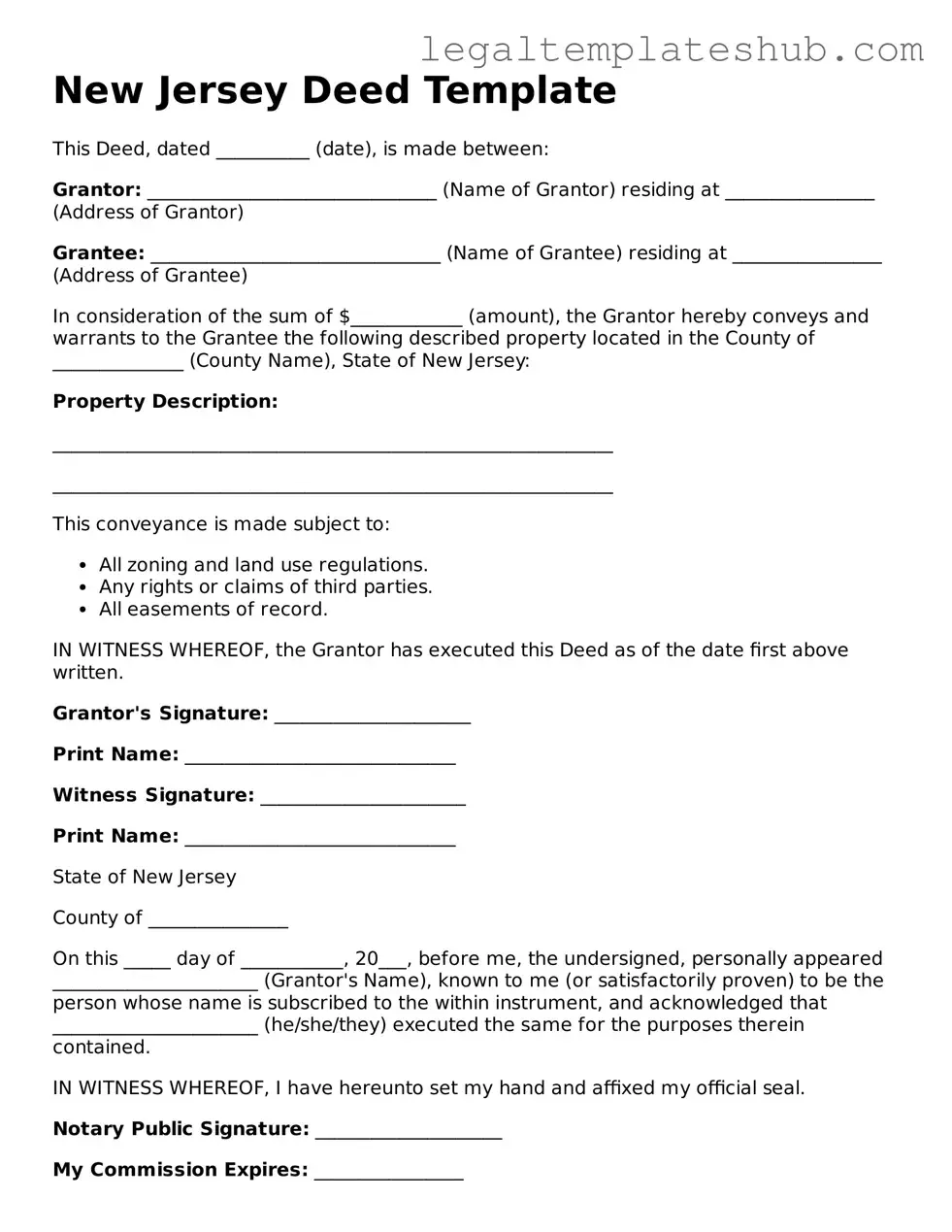Printable Deed Document for New Jersey
PDF Form Data
| Fact Name | Details |
|---|---|
| Governing Law | The New Jersey Deed form is governed by New Jersey Statutes, specifically Title 46, which pertains to property and conveyances. |
| Types of Deeds | New Jersey recognizes various types of deeds, including warranty deeds, quitclaim deeds, and bargain and sale deeds, each serving different purposes in property transfer. |
| Signature Requirements | The deed must be signed by the grantor (the person transferring the property) and should be notarized to be considered valid. |
| Recording | To protect the interests of the parties involved, the deed should be recorded in the county clerk's office where the property is located. |
Key takeaways
Filling out and using the New Jersey Deed form can seem daunting, but understanding a few key points can make the process smoother. Here are some important takeaways:
- Ensure the form is the correct type for your needs, such as a warranty deed or quitclaim deed.
- Accurately identify the grantor (the person transferring the property) and the grantee (the person receiving the property).
- Include a legal description of the property. This is crucial for clarity and future reference.
- Sign the deed in the presence of a notary public. This step is essential for the document to be legally binding.
- Be aware of any transfer taxes that may apply when the deed is filed.
- File the completed deed with the county clerk’s office where the property is located to ensure it is recorded.
- Keep a copy of the filed deed for your records. This can be important for future transactions or legal matters.
- Consult with a legal professional if you have questions or need assistance to avoid potential pitfalls.
By following these guidelines, you can navigate the process with confidence and ensure that your deed is completed correctly.
Dos and Don'ts
When filling out the New Jersey Deed form, it’s important to follow certain guidelines to ensure accuracy and compliance. Here’s a list of things to do and avoid:
- Do read the instructions carefully before starting.
- Do use clear and legible handwriting or type the information.
- Do include all required information, such as names, addresses, and property details.
- Do sign the deed in the presence of a notary public.
- Do double-check all entries for accuracy before submission.
- Don't leave any fields blank unless instructed.
- Don't use abbreviations that could cause confusion.
- Don't forget to include the correct legal description of the property.
- Don't submit the deed without the necessary signatures and notarization.
More Deed State Templates
Nc Deed Transfer Form - This document serves as a historical record of property ownership.
To assist you in documenting this vital transaction, you can find various resources, including the PDF Templates that can help you create a comprehensive New York Motorcycle Bill of Sale form, ensuring all necessary details are included for a clear and legitimate transfer of ownership.
What Does a House Deed Look Like in Ohio - Undivided interest can be conveyed through a deed to multiple parties.
Texas Deed Transfer Form - Deed forms are essential in real estate transactions.
Instructions on Filling in New Jersey Deed
After you complete the New Jersey Deed form, you will need to file it with the county clerk's office where the property is located. Make sure to keep a copy for your records. Follow these steps to fill out the form accurately.
- Start by entering the date at the top of the form.
- Provide the name of the grantor (the person transferring the property). Make sure to include their full legal name.
- Next, list the name of the grantee (the person receiving the property). Again, use their full legal name.
- Include the property description. This should detail the location and boundaries of the property. You can often find this information on the previous deed or property tax records.
- Indicate the consideration amount. This is the purchase price or value of the property being transferred.
- Sign the form in the designated area. The grantor must sign the deed for it to be valid.
- Have the deed notarized. A notary public must witness the signing and provide their seal.
- Finally, submit the completed form to the county clerk's office along with any required filing fees.
Misconceptions
Understanding the New Jersey Deed form is essential for anyone involved in property transactions in the state. However, several misconceptions can lead to confusion. Here are five common misunderstandings:
- All Deeds Are the Same: Many people believe that all deeds serve the same purpose. In reality, there are different types of deeds, such as warranty deeds and quitclaim deeds, each with unique implications regarding ownership and liability.
- Only Attorneys Can Prepare Deeds: Some think that only licensed attorneys can draft a deed. While it is advisable to consult a lawyer for complex transactions, individuals can prepare simple deeds themselves, provided they follow the required legal format.
- A Deed Must Be Notarized: A common assumption is that notarization is mandatory for all deeds. In New Jersey, while notarization is strongly recommended to prevent disputes, it is not always legally required for the deed to be valid.
- Deeds Are Permanent and Unchangeable: Many believe that once a deed is executed, it cannot be altered. However, deeds can be amended or revoked under certain conditions, allowing for changes in ownership or terms.
- Filing a Deed Is Optional: Some individuals think that filing a deed with the county clerk is not necessary. In fact, filing is crucial as it provides public notice of ownership and protects the rights of the property owner.
By dispelling these misconceptions, individuals can better navigate the complexities of property ownership in New Jersey.
